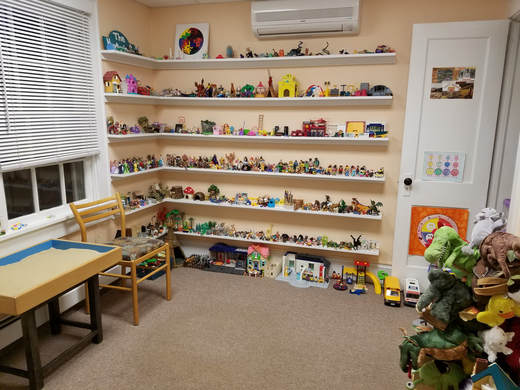
Play therapy is to children what talk therapy is to adults. It is a safe space to play out & play through thoughts, feelings & situations. Play therapy can be child-centered, therapist led, or somewhere in between, depending on the individual needs of each child & family. Play therapy is fun, creative, flexible, empowering, esteem-building, validating, focusing, challenging, joyful, therapeutic, nurturing, exciting & worthwhile. Play therapy can foster increased mastery, resiliency, self-control, self-esteem, creativity, and coping.
Morris County Play Therapy offers a wide variety of mediums for therapeutic expression including sandtray, therapeutic art, game play, and more!
According to the Association for Play Therapy, "Play therapy is a structured, theoretically based approach to therapy that builds on the normal communicative and learning processes of children (Carmichael, 2006; Landreth, 2002; O'Connor & Schaefer, 1983). The curative powers inherent in play are used in many ways. Therapists strategically utilize play therapy to help children express what is troubling them when they do not have the verbal language to express their thoughts and feelings (Gil, 1991). In play therapy, toys are like the child's words and play is the child's language (Landreth, 2002). Through play, therapists may help children learn more adaptive behaviors when there are emotional or social skills deficits (Pedro-Carroll & Reddy, 2005). The positive relationship that develops between therapist and child during play therapy sessions can provide a corrective emotional experience necessary for healing (Moustakas, 1997). Play therapy may also be used to promote cognitive development and provide insight about and resolution of inner conflicts or dysfunctional thinking in the child (O'Connor & Schaefer, 1983; Reddy, Files-Hall, & Schaefer, 2005)." (www.a4pt.org/?page=PTMakesADifference, 2016)
Morris County Play Therapy offers a wide variety of mediums for therapeutic expression including sandtray, therapeutic art, game play, and more!
According to the Association for Play Therapy, "Play therapy is a structured, theoretically based approach to therapy that builds on the normal communicative and learning processes of children (Carmichael, 2006; Landreth, 2002; O'Connor & Schaefer, 1983). The curative powers inherent in play are used in many ways. Therapists strategically utilize play therapy to help children express what is troubling them when they do not have the verbal language to express their thoughts and feelings (Gil, 1991). In play therapy, toys are like the child's words and play is the child's language (Landreth, 2002). Through play, therapists may help children learn more adaptive behaviors when there are emotional or social skills deficits (Pedro-Carroll & Reddy, 2005). The positive relationship that develops between therapist and child during play therapy sessions can provide a corrective emotional experience necessary for healing (Moustakas, 1997). Play therapy may also be used to promote cognitive development and provide insight about and resolution of inner conflicts or dysfunctional thinking in the child (O'Connor & Schaefer, 1983; Reddy, Files-Hall, & Schaefer, 2005)." (www.a4pt.org/?page=PTMakesADifference, 2016)
Play Therapy Can Help with a Wide Variety of Challenges & Experiences, such as:
- Anxiety / Worries
- Grief / Sadness
- Self-esteem / Confidence building
- Healing Trauma
- Building coping skills
- Anger / Frustration tolerance
- Difficulty transitioning to pre-school
- Communication
- Adjusting to life changes
- Parenting support